Mirkat Always Reading
I'm always reading something, usually multiple books at a time.
Meet Cute

"I don't want to for our lives to be over; I want to know right now, what will be?"
Daxton Hughes is a former teen heart throb clearly modeled on James Van Der Beek, who played the title character in Dawson's Creek. One of the big giveaways is that there is a popular internet meme of Daxton crying ("crying Dawson," anyone)? Also, the author most likely took the "W" and the "S" in the name "Dawson" and replaced each with the next letter in the alphabet. It's kind of funny that the author based the name on the character Van Der Beek played, since Daxton is the actor who played the lead in his universe's Dawson's Creek (It's My Life.) But I guess "Janfs" would have been harder to pronounce than "Daxton."
Coincidentally, I have recently been binge-watching the show Don't Trust the B in Apt 23, which featured Van Der Beek playing a post-Dawson version of himself, and of course the show made reference to the crying meme.
So, the female lead in Meet Cute is Kailyn Flowers. Five years before, she and Daxton Hughes graduated from the same law-school class at UCLA. Kailyn had been a huge fangirl and had met Hughes by physically colliding with him, when they were both in their first year. Through law school, they had a friendly rivalry that helped keep them both sharp. But at the end of final year, she relied on him to turn in a term paper for her, only to learn later that the professor had deducted points from the paper for late submission. The lost points caused her to just miss graduating first in their class, a position that went to Daxton. Ever since then, she has nursed a grudge, and told anyone who would listen that he's a terrible person.
One day, Daxton appears at Kailyn's office with his parents; they are setting up a trust for Daxton's 13-year-old sister Emme. That would be the end of their interactions for a long time, if not for the parents dying in a car accident soon after. Within the past six months, the parents have changed their will, so that Emme's legal guardian will be Dax, instead of her Aunt Linda.
Kailyn is needed as a lawyer, trustee, advocate for Emme, and a friend. Everything aligns for a romance between the leads, and I quickly picked up on some Pride and Prejudice playbook components. "Who does he think he is? He's SUCH A JERK! And I'll tell you why, based on [misunderstanding to be cleared up later]! But look how good he is with his little sister! He actually loves her and protects her!"
There were some elements that pulled me out of the story here and there, but overall, I could enjoy the book. Romance is generally not my genre, but I enjoyed this one, on balance. The reason I picked this read is that it was suggested in my library's summer-reading challenge, under the category "Light & Sweet Beach Reads."
Dear Girls

Hilarious, foul (at times) and sweet. The book is framed as a series of letters from the author, comedian Ali Wong, to her young daughters. The afterword is a letter from Wong's husband, Justin Hakuta, also to their daughters. Recommended to fans of Ali Wong's stand-up.
Narrated by the authors.
 2
2
Mayhem
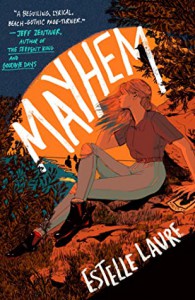
I was pleased to be invited to participate in the blog tour for this book. Please see banner at the bottom of the post for release date. I thank Netgalley, St. Martin's, and Wednesday Books for the invite and the ARC.
It's 1987, and Mayhem Brayburn and her mother Roxy are returning to their ancestral home in Santa Maria, California--after 13 years in Taylor, Texas and finally escaping Lyle, Roxy's abusive second husband. Mayburn was only three when Roxy took her away from their hometown after the death of her first husband/Roxy's father.
Waiting for them in Santa Maria is Roxy's twin sister Elle, who introduces them to the three foster children she has taken in: Neve, Jason, and Kidd. Santa Maria is a beach community, but all is not lazy days on the beach and boardwalk. Young women have been disappearing, and there might be a serial killer behind their disappearances.
Also, Brayburns are kind of a big deal in that town. People leave gift baskets as offerings. The family has apparently performed a service to the community for generations. But what exactly does that mean?
It is not long before Mayhem learns that being in the town awakes abilities in her, and that it's no coincidence that she has always been drawn to water. Her aunt's wards are tapped into the Brayburn lore and serve as guides for Mayhem.
The author, Estelle Laure, has written that she drew inspiration from sources like The Lost Boys and The Craft, which is part of why I was ready to "Yes, please" the invite. But I would say there is also a touch of the girl finding out she is "the chosen one," a la Buffy the Vampire Slayer. I anticipate that some readers might feel they want "more conflict" in the book, but I would counter that much of the conflict is inner (though characters also confront outside forces). There are some interesting struggles around "destiny" and what a parent can (and should) attempt to protect a child from.
Having the book set in 1987 was also fun for me. I was 20 in 1987, so four years older than Mayhem.

 1
1
Before I Go to Sleep

Every morning, Christine wakes up in an unfamiliar bed, in an unfamiliar house shared with a man who tells her that he is her husband Ben. He tells her that she has amnesia because of an accident that happened 20 years before. It's a little bit like "What if 50 First Dates were a thriller?"
Christine gets a call from a man who identifies himself as Dr. Nash. He tells her where to find a journal she has been keeping. Maybe through the journal and interventions from Dr. Nash, she can regain lost memories and piece together what has happened to her.
I ripped through this book quickly, wanting to find out what happened. I quickly developed theories, some of which were correct--though there was a twist I did not see coming. Although I was thoroughly engaged, it did turn out the be the kind of plot where, once resolved, I thought, "But that would never happen!
And once it was over, I wished there were at least one more chapter.
 2
2
Searching for Sylvie Lee
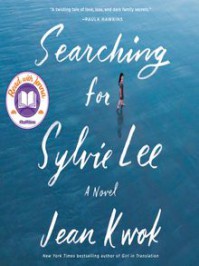
Sylvie Lee spent the first nine years of her life in the Netherlands, with Helena (a distant cousin of Sylvie's mother), Willem (Helena's husband), Lukas (Helena and Willem's son), and Sylvie's maternal grandmother. Sylvie's parents had migrated from China to Queens, New York and struggled to establish themselves. When Sylvie was brought back to New York, she had a two-year-old sister Amy.
Sylvie travels back to the Netherlands upon learning that her grandmother is terminally ill. And while she is there, Sylvie disappears.
Amy, who has always lived in the shadow of her accomplished older sister, follows after Sylvie, determined to discover what has happened to her. She soon becomes enmeshed in confusing family entanglements and long-held secrets.
The book had its share of red herrings, and I did not predict the resolution that ultimately emerged.
I appreciated the complexity of the family relationships, including some tragic mutual misunderstandings.
Sorry I'm Late, I Didn't Want to Come

I identify as an introvert. I'm an introvert with an extroverted mother who seemed to think I had a flaw that needed to be fixed. Jessica Pan does NOT hold that view, and she makes this clear in the author's note at the opening of this book. I raise this for people who are offended that this book even exists. Listen, Pan is not betraying her people. She never stops being "one of us."
Jessica Pan, raised in Amarillo, Texas; the daughter of a Chinese father and a Jewish mother, graduate of Brown University (so she's lived in Providence, RI); lived in Beijing, Paris, Melbourne; married to an English man with whom she currently resides in London--faced the scenario of having no friends (other than her husband Sam) where she lived. Her close friends were scattered across various countries. She face the realization that she was lonely and depressed. Her goal in experimenting in a year of "extroverting" was to build a new friend group, with the kind of friends who would "help you hide the body."
In case you are shout-thinking that Pan just needs to read Quiet: The Power of Introverts in a World That Can't Stop Talking , rest assured that she has, and she even cites it. She notes frequently that introverts value and crave "deep talk," and she triumphs whenever her new strategies allow her to achieve this kind of talk with new people.
During her year of "extroverting," Pan does scary things like talking to strangers, taking improv class, sharing a story on The Moth, taking stand-up classes that lead her to doing a stand-up routine a few times, going on a solo "surprise me" adventure trip (that mysteriously leads her to Budapest), and hosting a dinner party.
Spoiler alert: by the end, she still identifies as an introvert, though she believes she may have shifted from "shy introvert" to "gregarious introvert." Most of her new friends also identify as introverts. If you are an introvert who is offended that this book even exists, please just give it a chance. You don't even have to tell anyone.
Side note: One of the "Questions about this book" posted last year (2019) was whether there was a book from an extrovert choosing to live as an introvert for a year. Pan replied, positing that such a book would be called Sorry I'm Early, I Needed to Get Out. Ironically, now that we are in a global pandemic (for people reading this in the future, I am writing this in June of 2020)--we might well end up with plenty of memoirs in the genre of "Extrovert Forced to Live Like an Introvert During Quarantine."
Hazel Wood

Once upon a time, Althea Prosperine wrote a small collection of dark fairy tales, Tales From the Hinterland. The book has long been out of print, and it is very difficult to find any copies of it. Althea has a cult following, and her living as a recluse in a remote Upstate New York estate called the Hazel Wood only adds to her mystique for die-hard fans.
Alice Prosperine does not know her grandmother Althea. Alice and her mother Ella have always moved from place to place, always escaping "bad luck" that seemed to follow them everywhere. The nomadic existence ends only when Ella receives a letter informing her that Althea has died. This, according to Ella, means they are "free" and can stop moving. They settle in Brooklyn.
Then.... Something happens. The something involves the "bad luck." And Alice does something she never thought she'd do--teaming up with an Althea Prosperine fan and launching into an adventure she never wanted.
This book is the July selection for the "Forever YA" book club that I belong to, and I'm so glad it is. Because I would probably not have found my way to this book on my own, and I really enjoyed it. This book leaves me contemplating the power of stories and the meaning of world-building. I am definitely interested in the sequel.
[The audio version comes with a bonus novella called "The Boy Who Didn't Come Home," from the same universe. The Kindle version includes two stories from Tales From the Hinterland.]
Haywire Heart
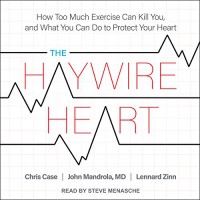
I don't feel equipped to give this book a star rating. I listened to the audiobook based on a recommendation from an atrial fibrillation Facebook support group that I recently joined. My first identified atrial fibrillation occurred in October of 2016, and I'd been doing marathons and trail 50k's. My afib was detected during a routine physical and confirmed by a cardiologist later that same day. However, when I was about to be given a cardioversion four days later, my heart was back to a normal sinus rhythm. I had no afib at my 2017 physical, but had it again in 2018, and since then it's been more prevalent. My cardiologist does not seem to make much of the endurance-athlete angle. Maybe because since I've started having the afib, I have gained a substantial amount of weight, and I don't think he sees an athlete when he looks at me. Just another fat heart patient who should really lose weight.
In any event, the book includes case studies about endurance athletes' experiences with afib, and their experience of afib tends to be considerably different from mine. They notice fluttering sensations and palpitations in their chests. I do not. I never really know I am in afib, though I've been noticing lately increased fatigue and sometimes shortness of breath during even mild exertion. However, it is difficult for me to know whether that is due to the afib or due to the meds I am on.
Still, this book is worth a read (or listen) for endurance athletes facing arrhythmias.
Atomic Habits

| The author views his book as a companion to The Power of Habit: Why We Do What We Do in Life and Business . Clear offers many practical steps one can take to build desired habits and cease undesired ones. He cites the web page atomichabits.com as a resource to access many helpful guides, checklists, and cheat sheets. The use of the word "atomic" is meant to denote "small," as in engaging in many small habits/behaviors to create a large payoff. I kind of wish he'd called the book Nano Habits instead. When I see "atomic," I think "explosive"! |
Real Lolita
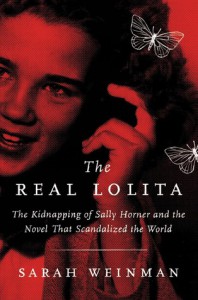
I think this article in The New Yorker captures my reaction perfectly:
The Salacious Non-Mystery of “The Real Lolita”
In 1948, an 11-year-old girl named Sally Horner was abducted by Frank La Salle, a 50-year-old pedophile. He had caught her trying to steal a notebook on a dare from popular girls at her school in Camden, NJ. He convinced her that he was an FBI agent who would spare her from being sent to reform school if she periodically "checked in" with him. He coerced her into telling her mother he was the father of school friends of hers and was taking them on a trip to Atlantic City. The Atlantic City trip (without the imaginary school friends) morphed into a 21-month, multi-state captivity for Sally. Tragically, she died in an auto accident just a couple of years after being returned to her family. La Salle was convicted of rape and kidnapping and received a life sentence.
Weinman makes much of the Sally Horner case as being the inspiration for Vladimir Nabokov's Lolita, while acknowledging that he had begun work on the novel years before the Sally Horner kidnapping occurred. She emphasizes the notion that the case provided the ultimate framework for the novel. There is a passage in Lolita where Humbert Humbert narrates a reference to Sally Horner, asking himself whether he was doing to Lolita what Frank La Salle had done to Sally. (Why, yes, Humbert!) Weinman seems indignant that Nabokov resisted naming a single real-life source for his inspiration, and she floats the odd theory that he included Humbert Humbert's allusion to the Horner case to protect himself against claims of plagiarism. Plagiarism? For basing a novel on a real-life case? There are countless novels that have real-life inspirations, and no one has charged those authors with plagiarism of real life.
The article I linked above sums up perfectly in the final paragraph:
“What Humbert Humbert did to Dolores Haze is, in fact, what Frank La Salle did to Sally Horner in 1948,” Weinman writes. What is the purpose of this statement? The phrase “The Real Lolita” implies its opposite: a sham “Lolita,” a prop, a lie, a fiction. But this book presents no evidence that Nabokov exploited Sally Horner to breathe life into his imaginings. What it insinuates, powerfully, is that Weinman has exploited both Sally and Nabokov to justify her prurient interest in yet another sad, dead girl.
Girl Who Lived Twice
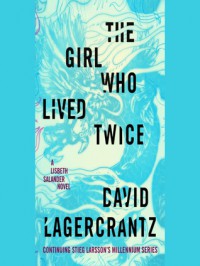
Sixth installment in the Millennium series; third continuation by David Lagercrantz. I have a soft spot for Mikael Blomkvist and Lisbeth Salander and do enjoy catching up with them, even when they don't 100% "feel" like their Larsson selves. Is it just me, or is there a pattern of "Blomkvist tries to find/reach Salander, who is hard to find and takes a while before she bothers to read/respond to his texts/emails/messages. And after a while, they finally meet up again, and their plots come together"?
There are conspiracies and cover-ups. There is a confrontation with Lisbeth's evil twin Camilla. The details almost don't matter, because in my head, what I ultimately care about is the Blomkvist-Lisbeth interaction.
The plot lines kept me interested, the narrative moved quickly, and the ending was fairly satisfying, but I wanted something more.
She Said

Once Weinstein and his legal team become aware that The New York Times plans to run a story on the women who reportedly experienced harassment by the Miramax producer, they attempt to stonewall and delay.
The book also covers Christine Blasey-Ford's path to testifying in the Brett Kavanaugh confirmation hearings. While I had been aware that she was a reluctant witness, I had not known just how much of an emotional toll the experience was to take on her. At the outset, she had been dead-set against traveling to Washington, DC for the hearings, let alone testifying in public.
The epilogue features of gathering of the authors and various women who had come forward to speak out against harassment and abuse, including Gwyneth Paltrow, Ashley Judd, Christine Blasey-Ford, and others. It ends on an uplifting note. Recommended.
Shine

While Patrick lies in a hospital bed, comatose and fighting for his life after being beaten and left for dead in an apparent anti-gay hate crime at the gas station/mini-mart where he works, his friend Cat launches her own investigation. The local police seem ready to assume that outsiders passing through town were responsible for the crime.
Until three years before, when they were both 13, Cat and Patrick were the best of friends. She pulled away from her friends after suffering a trauma she hasn't been able to talk about to anyone. She became a "ghost girl," and now, in the course of her investigation, she needs to bring herself back to the people she pulled away from.
The book pulled me along, as I needed to know what happened. I found the reveal much less surprising than Cat did. I agreed with the book's overall messaging, though sometimes I felt mildly condescended to. I write this while fully acknowledging that I am not the book's target audience (when my Forever YA book club discusses this book I will be celebrating my 53rd birthday).
There was a line near the end that was something like "it's right to be sad about sad things." So glad to have that explained to me!
 6
6
Good Girl's Guide to Murder

Despite the way Pippa has framed her project, her real motive is to clear Sal's name. She has never believed he could have committed murder, and aspects of the case never made sense to her. Her ambitious goal is to discover what really happened.
I won't reveal much more about the plot, so as to avoid spoilers. Pippa is a fun though sometimes frustrating protagonist, as she violates some of the "DON'T BE STUPID" warnings we readers tend to try to shout-think at book characters in books like this. Putting themselves into dangerous situations without backup; not confiding in trusted adults or others who could possibly help when receiving threats to "back off." That kind of thing. However, on balance I was hooked and enjoyed the unraveling. The book had twists I did not anticipate. Audio includes a full cast (project included recorded interviews).
Funny, You Don't Look Autistic

At the tender age of 22, comedian Michael McCreary wrote this memoir with the dual goals of helping neurotypical readers/listeners understand people on the spectrum and to help people on the spectrum navigate the NT world and feel less alone--and all with humor. McCreary shares his family/school/camp/job experiences, as well as his early attraction to performance and stand-up (the latter which he began to pursue in his teens). Along the way, he also pokes at certain stereotypes ("I'm very bad at math"; "I know nothing about computers, which is weird, because I thought we were supposed to be good at this computer stuff and … I think I’ll just phone a tech."
The book is a quick and enjoyable read/listen, and I recommend it to anyone who wishes to gain a better understanding of ASD, or at least one comedian's experiences with it.
 1
1
Very Stable Genius

| This book covered familiar-to-me ground, but it offered a variety of perspectives from people close to the events, resulting in a captivating yet horrifying narrative. |
 3
3



 2
2